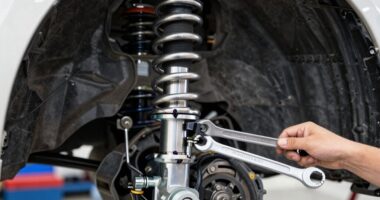A car tune typically lasts between 6 to 12 months or 5,000 to 15,000 miles, depending on your vehicle's specific needs. Regular tune-ups are essential for keeping your engine running smoothly and efficiently. They can help restore power and improve fuel economy. Making certain you check important components like spark plugs and filters guarantees you're catching potential issues early. If you neglect these tune-ups, you might face significant performance problems down the line. Staying on top of maintenance can save you money and time, plus keep your vehicle in excellent condition for years to come. Find out more about maintenance tips ahead. That’s why it’s important to schedule regular tune-ups with car tuning professionals who can thoroughly inspect your vehicle and make any necessary adjustments. By staying proactive with your car’s maintenance, you can avoid costly repairs in the future and ensure a smoother, more reliable driving experience. Don’t wait until you notice a decline in performance – be proactive and stay on top of your vehicle’s maintenance needs.
Key Takeaways
- A standard car tune-up lasts between 6 to 12 months or 5,000 to 15,000 miles, depending on driving conditions and vehicle type.
- Regular maintenance, including timely tune-ups, helps maintain engine performance and prevents fuel inefficiency.
- Key components like spark plugs should be replaced every 30,000 to 40,000 miles to avoid misfiring and fuel waste.
- Signs your vehicle needs attention include a check engine light and increased fuel consumption; address these early to avoid costly repairs.
- Choosing a reputable service provider with qualified technicians ensures effective maintenance and enhances your vehicle's longevity and performance.
Importance of Regular Tune-Ups
When it comes to keeping your vehicle running smoothly, the significance of regular tune-ups can't be overstated. Ideally, you should schedule a tune-up every six months or 5,000 miles. This routine maintenance helps guarantee that your engine performs at its best and can prevent unexpected breakdowns.
Did you know that nearly 50% of vehicles have at least one worn tune-up part? That's a significant number, highlighting the need for consistent attention.
A proper tune-up can restore power and improve your vehicle's fuel efficiency. Aging components like spark plugs can lead to reduced performance and poor gas mileage, but addressing these issues through a tune-up can make a world of difference.
By identifying and fixing minor problems early on, you can avoid costly repairs down the line.
During a tune-up, mechanics typically service essential components, including spark plugs, filters, and ignition system parts. These elements are crucial for maintaining not only your engine's efficiency but also its longevity.
Signs Your Car Needs Attention

If your check engine light pops on, it's time to take action, as it could signal a range of issues from a loose gas cap to more serious engine problems.
You might also notice your car guzzling fuel more than usual, which indicates that a tune-up is overdue.
Recognizing these signs early can save you from costly repairs down the road.
Engine Light Activation
Seeing your engine light illuminate can be concerning, as it often signals that your car needs immediate attention. Ignoring this warning can lead to severe problems, including costly repairs. It's important to diagnose the issue promptly at a qualified service center.
The engine light may activate for several reasons, such as a loose gas cap or faulty oxygen sensors. If this occurs, you should consider a complete tune-up, which can restore engine performance and address the underlying issues. Below is a table summarizing common reasons for engine light activation:
| Issue | Description |
|---|---|
| Loose Gas Cap | Can trigger engine light; tighten to fix. |
| Faulty Oxygen Sensors | Affects emissions and performance; needs replacement. |
| Poor Performance | Indicates potential engine issues; check fluids. |
| Increased Emissions | Signals that maintenance is required. |
| Regular Maintenance | Vital to prevent engine light activation. |
Poor Fuel Economy
Experiencing a sudden drop in fuel economy can be a clear sign that your car needs attention. When you notice that you're filling up more often, it's time to investigate potential causes. Poor fuel economy often indicates that your vehicle may require a tune-up. Aging spark plugs, wires, and filters can considerably hinder engine performance, causing your mileage to plummet.
Additionally, just like managing Bitcoin IRA volatility, regular maintenance is key to ensuring peak fuel efficiency. Make sure to replace your air filters every 30,000 miles and your oil filters every 3,000 miles to keep your engine running smoothly. A complete tune-up can restore power and improve fuel efficiency, allowing your vehicle to achieve the best possible miles per gallon.
If you're experiencing unusually poor gas mileage, it might also signal issues with the fuel injection system. This system is critical for maintaining efficiency, and any malfunction can lead to further drops in fuel economy. Routine checks and replacement of worn components can prevent deterioration, ultimately saving you money on gas and reducing emissions.
Don't ignore those signs—addressing fuel economy issues promptly can keep your car in top shape.
Components of a Standard Tune-Up
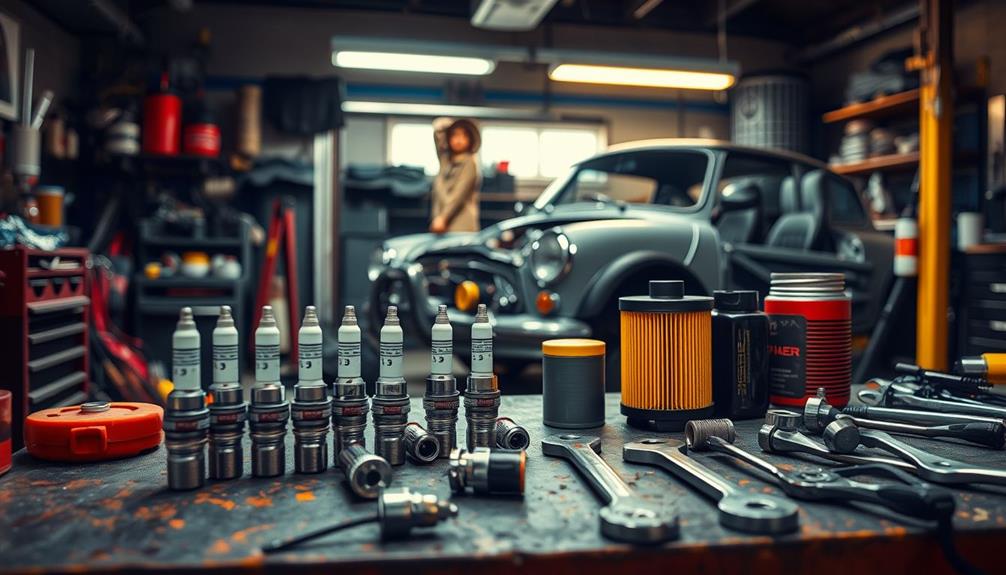
When it comes to maintaining your car, understanding spark plug replacement timing and oil change frequency is essential.
You should replace spark plugs every 30,000 to 40,000 miles to keep your engine running smoothly.
Regular oil changes, typically every 7,500 to 15,000 miles, guarantee your engine stays lubricated and efficient.
Spark Plug Replacement Timing
Many car owners overlook the importance of timely spark plug replacement, but it's vital for maintaining ideal engine performance. Typically, you should replace your spark plugs every 30,000 to 40,000 miles.
When you fail to do this, worn spark plugs can lead to misfiring, wasting up to 2 gallons of gas per tank and hurting your fuel economy. As the electrodes erode, gaps widen, making it harder for the spark to ignite the fuel mixture effectively. This can result in rough engine operation and increased emissions.
Regularly inspecting your spark plug wires is just as essential since they play a significant role in delivering electric current to the plugs. If you notice any signs of carbon buildup on your spark plugs, it's a clear indication that they need attention.
Using high-quality spark plugs suited to your vehicle's specific requirements can greatly enhance overall engine performance and longevity.
Oil Change Frequency
To keep your engine running smoothly, regular oil changes are vital. The frequency of these oil changes depends on the type of oil you use and your vehicle's specific needs. Following your owner's manual is essential for maintaining engine efficiency and preventing unnecessary wear.
Here's a quick overview of oil change intervals:
| Oil Type | Recommended Change Interval |
|---|---|
| Conventional Oil | Every 3,000 – 5,000 miles |
| Synthetic Oil | Every 7,500 – 15,000 miles |
| High Mileage Oil | Every 5,000 – 7,500 miles |
Regular oil changes are a key component of preventive maintenance, helping to guarantee that your engine stays well-lubricated and functions at its best. Neglecting these intervals can lead to sludge buildup, decreased engine efficiency, and expensive repairs down the line. During a standard tune-up, don't forget that replacing the oil filter is just as important to keep contaminants at bay. By adhering to recommended oil change frequencies, you'll extend your engine's lifespan and keep it in excellent shape.
How Long a Tune-Up Lasts
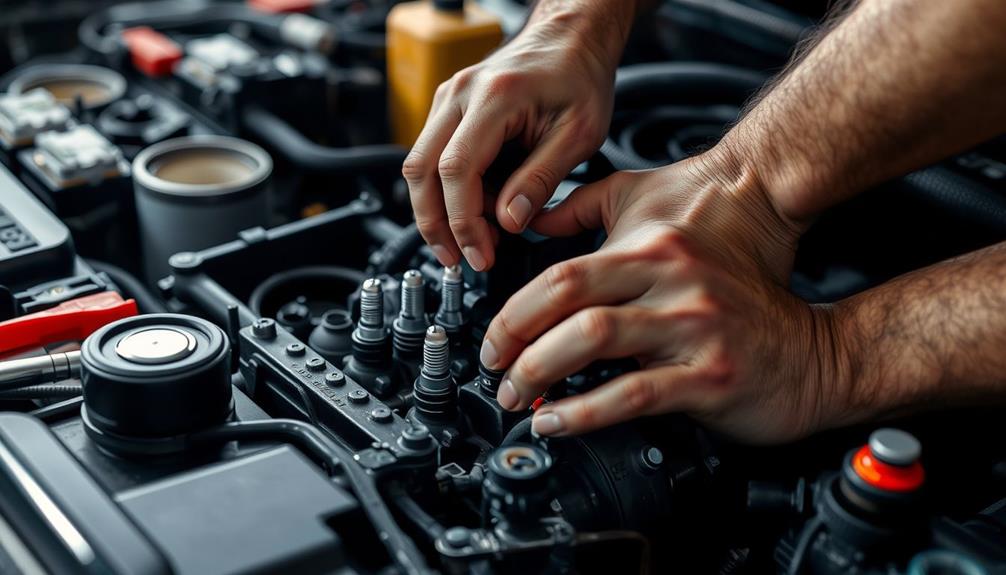
A standard tune-up can keep your vehicle running smoothly for 6 to 12 months or between 5,000 and 15,000 miles, depending on its condition and maintenance schedule.
Regular maintenance, including tune-ups, plays an essential role in maintaining your vehicle's performance. By ensuring that components like spark plugs are replaced at appropriate intervals—ranging from 30,000 to 100,000 miles—you can prevent potential issues that may arise from neglect.
It's important to remember that engine components are designed to work effectively for a certain mileage. If you skip tune-ups, you might notice a decline in performance and fuel efficiency over time.
Newer vehicles equipped with advanced engine management systems may not require a tune-up until after reaching 100,000 miles, but that doesn't mean you should ignore regular inspections of key components.
Benefits of Timely Maintenance
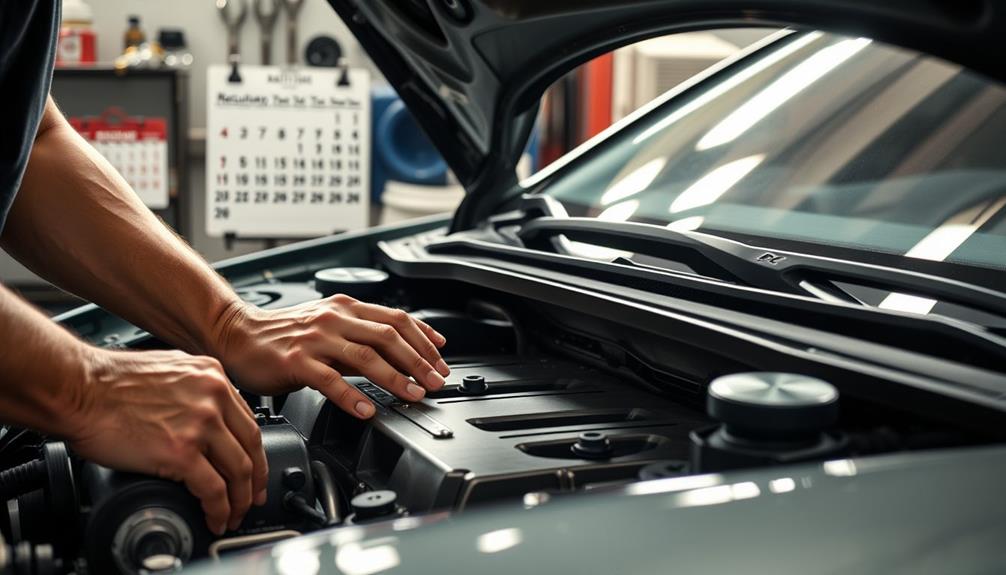
Neglecting regular maintenance can lead to reduced performance and unexpected breakdowns, but keeping up with timely maintenance offers numerous benefits. By prioritizing preventive maintenance, you can enhance your vehicle's overall health and enjoy a more reliable driving experience.
Additionally, just as essential oils for toothache relief can provide targeted support for discomfort, regular maintenance can help address minor issues before they escalate.
Here are four key advantages of timely maintenance:
- Improved Fuel Efficiency: Regular tune-ups restore peak engine performance, which can save you significant amounts in fuel costs over time.
- Fewer Breakdowns: Consistent maintenance reduces the risk of unexpected breakdowns, helping you avoid costly repairs and extending your vehicle's lifespan.
- Enhanced Vehicle Reliability: By identifying minor issues early on, timely maintenance contributes to safer driving conditions and guarantees your vehicle remains dependable.
- Better Resale Value: Properly maintained vehicles often achieve higher resale values. Prospective buyers are more inclined to choose cars with documented service histories and well-maintained components.
Following manufacturer-recommended maintenance schedules guarantees all critical components are replaced at peak intervals, maximizing your vehicle's performance and fuel efficiency.
Choosing the Right Service Provider
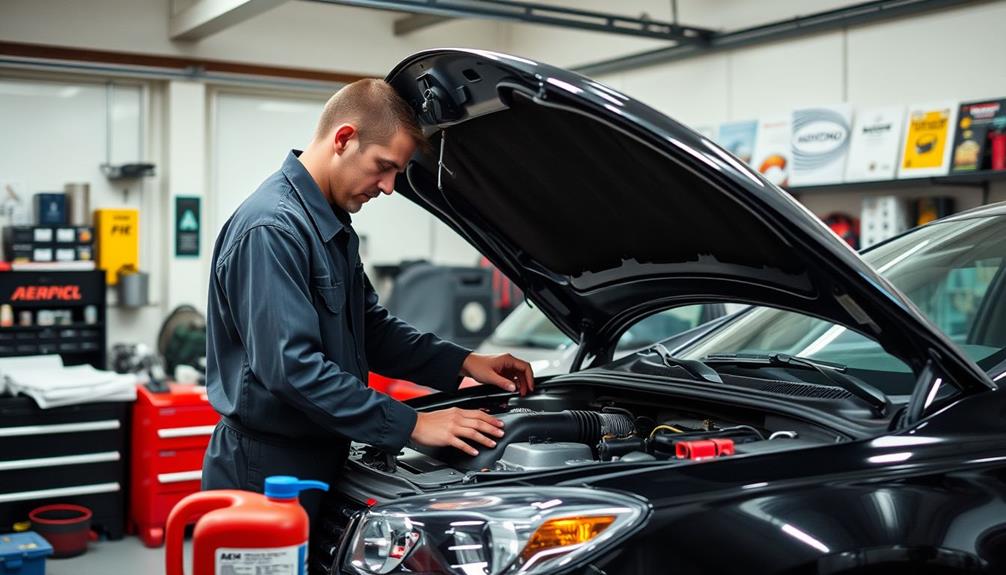
Finding the right service provider for your car tune-up is vital for maintaining your vehicle's performance and longevity. Start by researching local repair shops with solid reputations and positive customer reviews. This step helps guarantee you receive quality service.
Look for technicians who specialize in your vehicle make, as their specific experience can directly influence the effectiveness of the tune-up.
Before committing, always obtain detailed estimates and service descriptions. This practice helps you avoid unexpected costs and assures you know exactly what to expect.
It's also important to verify that the repair shop employs qualified mechanics. Their certifications can greatly impact the quality and reliability of the service provided.
Regular communication with your service provider is key. Discuss your vehicle's performance and any issues you've noticed. This dialogue allows the mechanics to tailor the tune-up to your car's specific needs, ultimately enhancing its performance.
Frequently Asked Questions
How Long Does a Car Tune Last?
A car tune lasts between 30,000 and 100,000 miles, depending on your vehicle's age and maintenance. Regularly check components like spark plugs and wires to make certain your engine runs efficiently and maintains peak performance.
Does Tuning Reduce Engine Life?
Tuning can reduce engine life if it's done aggressively or without proper maintenance. You need to guarantee your vehicle's components can handle the stress, and always follow recommended maintenance schedules to keep it running smoothly.
Is Tuning a Car Permanent?
Tuning a car isn't permanent. If you disconnect the battery or reset the ECM, it'll revert to original settings. You'll need to retune after modifications or if performance starts to decline over time.
How Many Miles Does a Tune-Up Last?
Think of your car as a finely tuned instrument. A typical tune-up lasts between 30,000 to 100,000 miles. Regular checks and following your manufacturer's schedule guarantee your vehicle performs at its best for longer.
Conclusion
In short, keeping up with regular tune-ups can save you from a heap of trouble down the road. By knowing the signs your car needs attention and understanding what a standard tune-up involves, you'll guarantee your vehicle runs smoothly for years to come. Don't wait until things go south—make timely maintenance a priority. Remember, a well-tuned car isn't just a luxury; it's a necessity for safe and efficient driving. So, gear up and take action!


